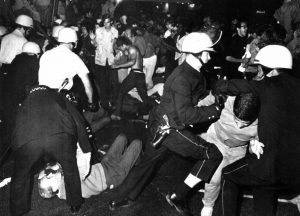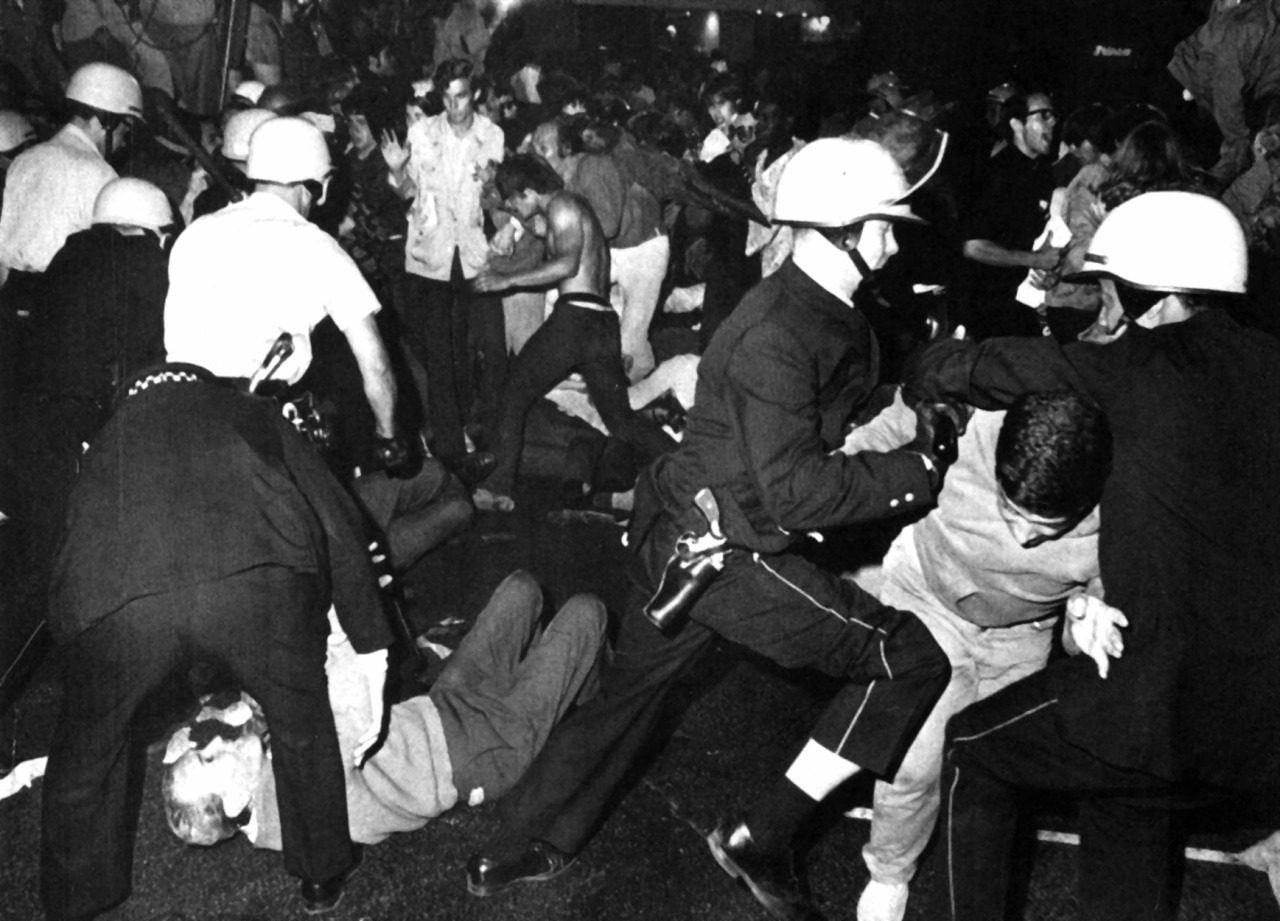Ken Burns’ Vietnam War documentary — Democrat civil war
For a brief time, the civil war at the 1968 Chicago Democrat Party convention was more consequential than the battles still taking place in Vietnam.
 In my previous post about the Ken Burns’ Vietnam documentary, I looked at his coverage of the Tet Offensive — both what he included and what he excluded. Last night I watched the episode about the months immediately after the Tet Offensive. Here are a few thoughts:
In my previous post about the Ken Burns’ Vietnam documentary, I looked at his coverage of the Tet Offensive — both what he included and what he excluded. Last night I watched the episode about the months immediately after the Tet Offensive. Here are a few thoughts:
1. The Tet Offensive was a disaster for North Vietnam. Although Burns shies away from saying it, it’s apparent that, if Johnson had listened to his military advisers, rather than his political advisers, and pressed harder against the North, the war would have ended quickly with a North Vietnamese defeat.
2. Burns touches lightly upon the fact that, in North Vietnam, people were beginning to realize that their government was lying to them. One person stated that the government spoke only of victories (the Tet Offensive was sold as a victory) and never once acknowledged that any troops had died. The fact is, though, when you have over 1 million combatant deaths, people might start noticing.
3. America’s troops in Vietnam were incredibly brave.
4. Burns pushes hard on the narrative that most American men fighting the Vietnam War were mostly poor, dumb college drop-outs who were drafted against their will. Even the Washington Post, though, has acknowledged that this is a myth:
Between 1964 and 1973, volunteers outnumbered enlisted troops by nearly four to one. Nor did the military rely primarily on disadvantaged citizens or African Americans. According to the Report of the President’s Commission on an All-Volunteer Armed Force in February 1970, African Americans “constituted only 12.7 percent of nearly 1.7 million enlisted men serving voluntarily in 1969.” A higher proportion of African Americans were drafted in the early years of the war, but they were not more likely to die in combat than other soldiers. Seventy-nine percent of troops had at least a high school education (compared with 63 percent of Korean War veterans and 45 percent of World War II veterans). And according to VFW Magazine, 50 percent were from middle-income backgrounds, and 88 percent were white (representing 86 percent of the deaths).
Those volunteers who sit for interviews all see the war as a waste and a mistake. That is, once again, Burns excludes from the show men who thought the war was important but that politics prevented it from being successful.
5. American goods kept the Saigon economy afloat, and there was tremendous graft and corruption. I haven’t independently researched this point, but I don’t doubt that it was true. This same corruption saw South Vietnamese troops, based upon information acquired through a CIA program, torture and summarily execute people they thought were Viet Cong. Graft and vengeance killings are historically par for the course in war, but they don’t look good played out on American televisions.
6. What we were seeing at home was a Democrat civil war: the Johnson pro-War party versus the McCarthy anti-War party. That war spilled onto the streets and into the convention hall during the Democrat’s 1968 convention. Neither side came out looking good. And if you’re looking for police brutality, just take a look at Mayor Daley’s good Democrat cops brutally attacking white, middle-class youth. As I discuss at points 8 and 9. below, in 1968 this war was more consequential than the actual fighting in Vietnam.
7. Burns kept showing that America was not the only place in which there were riots in the street. He frequently showed shots of London, Paris, and other major European cities. In all cases, these were Leftist youth rioting against a non-Leftist, or insufficiently Leftist, establishment. Unless I fell asleep (something that often happens to me when I listen to Peter Coyote’s narration), the most interesting street riots in 1968 didn’t make it into Burns’ documentary: The Prague Spring, which the Soviet Union ruthlessly put down. Funny how his little sins of omissions always protect the Left….
The logical conclusion is that violence always trails in Leftism’s wake.
8. Burns alleges, and I have no reason to disbelieve (and I have not independently researched the point), that one of Nixon’s tricks was to tell Saigon to back out of peace talks that Johnson arranged, because Nixon, when president, would get them a better deal. Saigon pulled out days before the election, when it looked as if Humphrey, who had just broken with Johnson and announced that he supported a pull-out, would win. According to Burns, this destroyed Humphrey’s probably victory.
The irony was that Johnson knew precisely what Nixon had done, because the CIA (and the FBI?) had bugged the conversations. The problem for Johnson was that he couldn’t admit to this fact, so he had to accept as true Nixon’s claim that he would never have done something so underhanded. This, says the documentary, is why Nixon won.
9. Even thought Burns claims that, but for Nixon’s subterfuge, Humphrey was on the verge of winning, my gut says he still wouldn’t have won. (And again, this is a statement based on the show and my own knowledge of the world; I haven’t done independent research.) For one thing, it was clear to Americans that the Democrats were engaged in a civil war. Only a fool votes for a party in the midst of a civil war.
For another thing, while Nixon may not have shown up well against Kennedy (especially because Nixon in that infamous last debate was ill and Kennedy was caked with robust tan makeup), by 1968, things had turned around. Nixon looked vital and strong, and spoke in a deep, resonant voice. Meanwhile, Humphrey looked and sounded exactly like someone’s maiden aunt. In times of turmoil, one does not look to the maiden aunt for succor.
It’s not too hard to see parallels between the 1968 election and the 2016 election. Trump looked vital and strong. Hillary looked and sounded exactly like every man’s angry ex-wife — and one with a health problem to boot. In addition Hillary represented a party that was (and still is) actively engaged in a civil war. In a dangerous world, one doesn’t vote for the sick, angry ex-wife. One votes for the robust, commanding, successful man. Looking at 1968, one could have predicted 2016.
And that’s all.
*****


